If you’ve recently had a severe cold that turned into a nagging cough, you might be suffering from bronchitis.
Bronchitis is a condition of inflammation, infection or swelling in the bronchial tubes, which carry oxygen from your nose to the windpipe and further down to your lungs. A virus, bacteria or particles that irritate your nasal passages usually cause the inflammation. (1)
The inflamed lining of the bronchial tubes produce excess mucus, making your cough worse and leading to symptoms like chest congestion, persistent coughing, difficulty breathing and a low-grade fever.
The condition can also cause wheezing and lead to shortness of breath. Understanding the symptoms of bronchitis will help you treat bronchitis.
Other common symptoms associated with bronchitis include:
- Whooping cough with mucus
- Nasal congestion
- Fatigue
- Muscle aches
Bronchitis can be acute (short term) or chronic (long term). (2) (3) In both cases, the irritated tubes swell and grow thicker, restricting proper air flow to the lungs. Acute bronchitis is usually a result of an infection or exposure to irritants, while chronic bronchitis (sometimes called smoker’s cough) is mainly caused by cigarette smoking.
Acute bronchitis is not a major health concern, but repetitive episodes of chronic bronchitis may lead to scarring of the lungs, posing a greater risk for numerous severe respiratory infections.
Contents
Natural Ways to Treat Bronchitis
Over-the-counter medications to manage and curb the symptoms are available, but they may have side effects. There are some simple and effective home remedies that can help you cure the condition naturally.
Here are four popular remedies to treat bronchitis naturally.
Method 1: Use Apple Cider Vinegar
Due to the acetic acid and probiotics present in apple cider vinegar, it helps beat bronchitis by balancing the pH levels in the body to reduce inflammation and swelling. (6)
Honey acts as a natural demulcent to soothe the cough (5) that occurs with bronchitis. Moreover, the antiviral, antibacterial and anti-inflammatory properties of honey help reduce the swelling of the bronchial tubes.
An apple cider vinegar and honey concoction works as an incredible expectorant to reduce the thickness of the mucus and expel the phlegm, thus relieving bronchitis to a great extent.
Things you’ll need:
- Apple cider vinegar (reduces inflammation and swelling) – ¼ cup
- Honey (natural demulcent) – 1 tablespoon
- Filtered water – 2 cups
Step 1. Pour water, apple cider vinegar and honey in a pitcher
- Pour 2 cups of water into a pitcher.
- Add ¼ cup of apple cider vinegar to the water.
- Add 1 tablespoon of honey as well.
Step 2. Stir thoroughly and drink the concoction daily
- Mix the ingredients together until completely dissolved.
Drink this concoction once daily until it treats your bronchitis.
Method 2: Use Garlic
The naturally occurring antibiotic, antiviral and anti-inflammatory properties in garlic make it one of the best remedies for combating bronchitis. Garlic contains allicin, a compound that reduces inflammation and fights infection.
A 2019 animal based study published in Animals, stated that garlic supplementation helped in clearing mucus and blocked airways. (4)
Honey, which also has antibiotic and anti-inflammatory properties, forms a coating around the mucus membranes to soothe forceful coughing.
Together, garlic and honey form a powerful antibacterial concoction to relieve your bronchitis.
Things you’ll need:
- Garlic, minced (reduces inflammation and fights infection) – 2 tablespoons
- Honey (has antibiotic and anti-inflammatory properties) – 2 tablespoons
Step 1. Combine minced garlic and honey
- Put 2 tablespoons of minced garlic cloves in a small bowl.
- Add an equal portion of honey to it.
Step 2. Mix well and consume 1 teaspoon twice daily
- Mix the contents well to form a paste.
Consume 1 teaspoon of this paste 2 times daily until you get relief from bronchitis symptoms.
Method 3: Use Hydrogen Peroxide Inhalation
Hydrogen peroxide works like a charm to thin mucus in the bronchial tubes, thus providing instant relief from persistent coughing and congestion in the lungs.
Nebulized hydrogen peroxide not only contacts the lungs, it enters your bloodstream to oxidize toxins and pathogens.
Single-Step Treatment: Dilute hydrogen peroxide in water
- Dilute 0.5 ml of 3% food-grade hydrogen peroxide (approximately 10 drops) in 1 tsp (5 ml) of water.
- Use a nebulizer to breathe in the solution for 3 minutes.
- Repeat 4 or 5 times each day until you get relief from bronchitis symptoms.
You can increase the dose depending upon your toleration levels to a maximum of ½ tsp (2 ml) in 1 tsp (5 ml) of water (1 ml contains about 25 drops), for a maximum of 10 minutes.
Important notes for this therapy
- Use only 3% food-grade hydrogen peroxide in a nebulizer.
- If your solution is too strong, it could cause tissue-damaging inflammation in your lungs, so be careful when diluting hydrogen peroxide. Follow the measurements given above and always dilute the hydrogen peroxide before using in a nebulizer.
- If you are using this therapy for the first time, use a minimal dose to test your reaction.
- If symptoms like a headache, flu, fever, fatigue or diarrhea appear after nebulizing, this is probably because your solution is too strong. Immediately reduce the dosage.
Method 4: Use Ginger, Cinnamon and Clove Tea
Ginger cinnamon and cloves contain compounds with natural antibacterial, antiviral, analgesic, anti-inflammatory and expectorant properties that remove mucus from the bronchial tubes to relieve congestion. (7)
The concoction works amazingly well to loosen the respiratory tract, improve breathing and treat congestion and infections in the respiratory tract.
Things you’ll need:
- Ginger, diced into chunks (helps relieve congestion) – 1 teaspoon
- Cinnamon sticks (remove mucus from bronchial tubes) – 3 or 4 (approximately 1 inch each)
- Cloves (contain antibacterial properties) – 4 or 5
- Honey (soothes coughing) – 1 teaspoon
- Water – 2 cups
Step 1. Heat water in a pan
- Pour 1 to 2 cups of water into a pan.
- Turn on the heat.
Step 2. Add herbs and spices
- Add 1 teaspoon of minced ginger to the water.
- Add 3 or 4 cinnamon sticks.
- Add 4 or 5 cloves.
Step 3. Boil and strain the tea
- Bring the mixture to a boil.
- Simmer for 5 minutes.
- Put the tea through a strainer to separate the ginger, cinnamon and cloves from the infused water.
Step 4. Add sweetener and drink the tea 3 times a day
- Add 1 teaspoon of honey to the infused water.
Drink this tea 3 times daily for quick relief from persistent coughing and discomfort.
Tips for bronchitis relief
- Do not smoke. Smoking is a major cause of bronchitis.
- Avoid lung irritants like dust, smoke, vapors, fumes and air pollution. Wherever possible, wear a mask to cover your nose and mouth to avoid exposure.
- Warm and moist air helps vaporize mucus. Use a vaporizer to remove mucus that is thick or difficult to cough up.
- Exercise regularly.
- Get plenty of rest. Constant coughing may make you feel tired, so get proper rest and give your body enough time to heal.
- Vitamin C helps fight off respiratory infections. Eat more foods rich in vitamin C or take supplements (up to 2,000 mg each day). Consult your doctor before taking supplements.
Resources:
- National Heart Lung and Blood Institute. https://www.nhlbi.nih.gov/health-topics/bronchitis.
- Singh A. Acute Bronchitis. StatPearls [Internet]. https://www.ncbi.nlm.nih.gov/books/NBK448067/. Published March 22, 2019.
- Widysanto A. Chronic Bronchitis. StatPearls [Internet]. https://www.ncbi.nlm.nih.gov/books/NBK482437/. Published March 13, 2019.
- Saastamoinen M, Särkijärvi S, Hyyppä S. Garlic (Allium Sativum) Supplementation Improves Respiratory Health but Has Increased Risk of Lower Hematologic Values in Horses. Animals : an open access journal from MDPI. https://www.ncbi.nlm.nih.gov/pmc/articles/PMC6356413/. Published January 2, 2019.
- Cohen HA, Rozen J, Kristal H, et al. Effect of honey on nocturnal cough and sleep quality: a double-blind, randomized, placebo-controlled study. Pediatrics. https://www.ncbi.nlm.nih.gov/pubmed/22869830. Published September 2012.
- Probiotics (live micro-organisms) to prevent upper respiratory tract infections (URTIs) (for example, the common cold). Probiotics (live micro-organisms) to prevent upper respiratory tract infections (URTIs). https://www.cochrane.org/CD006895/ARI_probiotics-live-micro-organisms-to-prevent-upper-respiratory-tract-infections-urtis-for-example-the-common-cold.
- Chang JS, Wang KC, Yeh CF, Shieh DE, Chiang LC. Fresh ginger (Zingiber officinale) has anti-viral activity against human respiratory syncytial virus in human respiratory tract cell lines. Journal of ethnopharmacology. https://www.ncbi.nlm.nih.gov/pubmed/23123794. Published January 9, 2013.
Summary of How to Treat Bronchitis Naturally
Download this infographic.


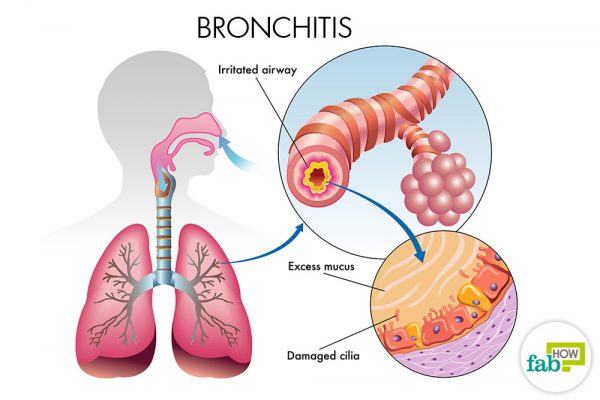
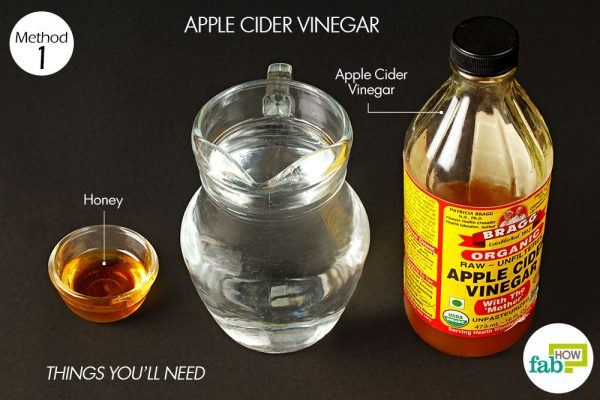

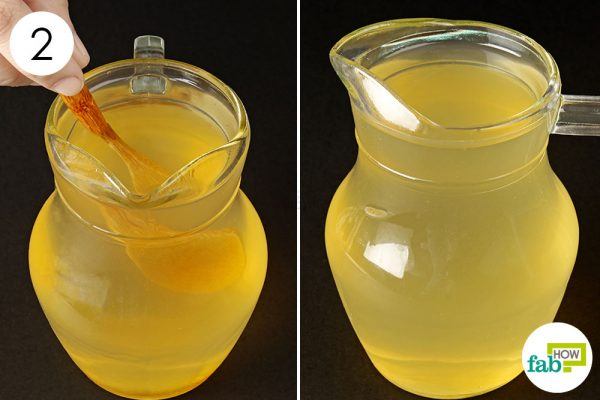

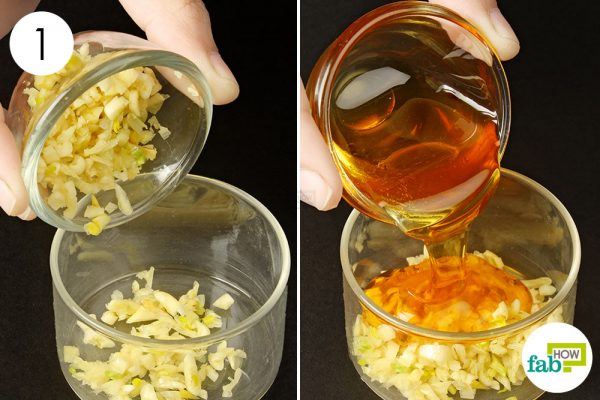





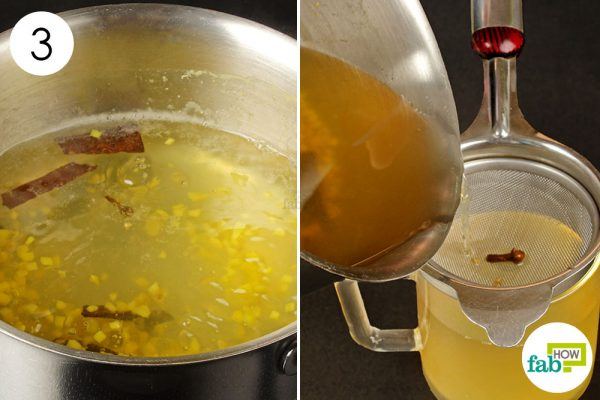
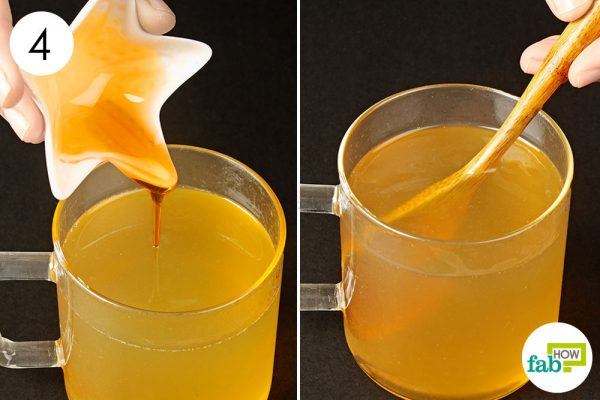


I have been diagnosed with Chronic Bronchitis before, and had gone to the doctors a couple of times whenever it cropped up. However after the second visit, I decided to try to find a way to fight it, myself. The tips I found here were good, but, I found my own way. I already have heavy mucus due to allergies, I think, though it runs whenever I go outside. So if it ever goes green or yellow, I figure bronchitis will soon follow. When that happens, I buy 2 gallons of Orange Juice for the Vitamin C..drinking one in one day, and the other over time. I also buy a couple of cases of Yogurt and eat 2 cups a day, as I’ve heard the bacteria that makes the Yogurt helps fight off sickness. And to be honest? The OJ and the Yogurt does indeed help. If I need more, I buy it, but it generally clears up within a couple of weeks. So far, using that method, I’ve not had to go back to the doctors for bronchitis in over 9 years.
Do you drink the whole 2 + cups of the apple cider, honey concoction or just one cup at a time?
Dear Angel
Thank you for your comment.
You can prepare the concoction in the morning and keep sipping on it cup by cup for the entire day.
No need to consume it all at once.
Hope we were able to help.
-Team FabHow
Vinegar and honey is the best. It thins mucous and pulls it out your body very good. I had congestion really bad last month. I was over dosing on mucinex. I was taking 8 a day. 4 at a time. With plenty water. It was making me gag a lot with the mucous trying to come up. I tried the warm vinegar and honey, went to sleep and was able to sleep without gagging in my sleep. It thinned the mucous and I just blew my nose all day with no problems. I will no longer buy mucinex or anything over the counter. Apple cider vinegar and honey is my go getter when sick
Dear Meme
Thank you for your feedback. This motivates us to work better for our users and help them solve their problems.
Stay with us for more such informative content.
-Team FabHow
This is a really well done article; thank you. When I first saw that I was supposed to add 1/4 cup ACV to 2 cups of water, it seemed way too much, but with the honey in there as well, it goes down pretty easily. I can already feel it loosening some of the mucus in my system. I think I caught this before I got bronchitis, but I also think I was on the path to getting it for sure, as my cough was getting much worse. Greatly appreciate the helpful tips, very nicely done article!
Hey Nate
Hope you feel better soon!
And, thank you so much for such kind words for us 🙂
I’m pleased by the manner in which fabhow.com covers this sort of issue. Generally to the point, often polemic, without fail thoughtful and more often than not quite thought-provoking.
Hey Kittie
Thank you for your words. Please let us know if you have any feedback for us!